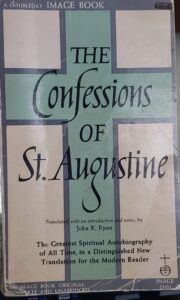
As I’ve said many times on this blog, a time of downsizing from our living circumstances is coming. As part of that, we need to get rid of about half of our 3,000 to 4,000 books. That number is after we have sold or donated many already. I figure well over 1,000 books are already gone. So in choosing books to read, I scan our shelves and try to choose something that looks interesting but is something I most likely won’t want to keep.
A number of our books are what could be called Christian classics. So a couple of months ago, when it was time to start a new book, my eyes fell on The Confessions of Saint Augustine. Written over 1,600 years ago, this meets the definition of Christian classic. I thought, it’s probably something every Christian should read. I started it in early 2023, read it on four days, put it aside, and picked it up again in late November last year.
Why did I lay it down after four days? Because I found it hard to read and understand. The book I read it in was translated by John K. Ryan. The original, of course, is in Latin. I suppose the readability will depend on the translation. Or is it possible that all translations can’t do more with the English construction than the original language gives you? I suppose I would need to read a different translation to find out.
Why didn’t I like it? Perhaps it’s due to passages like this one.
In truth, I should have wished, had I then been Moses—for we all come from the same clay, and what is man, unless because you are mindful of him?—I should have wished, if I had been what he was, and had been enjoined by you to write the book of Genesis, that such power of eloquence had been given to me, and such ways to fashion words that not even they that cannot yet understand how God creates things would reject my words as beyond my powers; while they who can already understand, no matter what true interpretation they have arrived at in their thought, would not find it passed over in your servant’s few words; and if some other man by the light of truth had perceived a further meaning, it should not fail to be understood from those same words.
And that’s just one sentence! The whole book is like that.
I found myself reading and not comprehending at all. The Confessions consists of thirteen books, each book broken down into multiple short chapters. I started each book with renewed determination to understand what I was reading. Alas, by the second chapter I would once again be reading the words but not comprehending.
When I was about halfway through I thought about giving up. But I pressed on. Sometimes the paragraphs put me to sleep; sometimes they were just incomprehensible. The main reading took me from Nov 29 to Jan 18. Rarely could I read as many ten pages at a sitting.
Well, this is quite a downer of a review. As you can tell, this book is not a keeper. But no worries: I have two more copies of it. Maybe, in a few years, I’ll pull out one of the others and see if another translation will be easier. But this mass-market paperback is going in the donation pile.
On to something else.